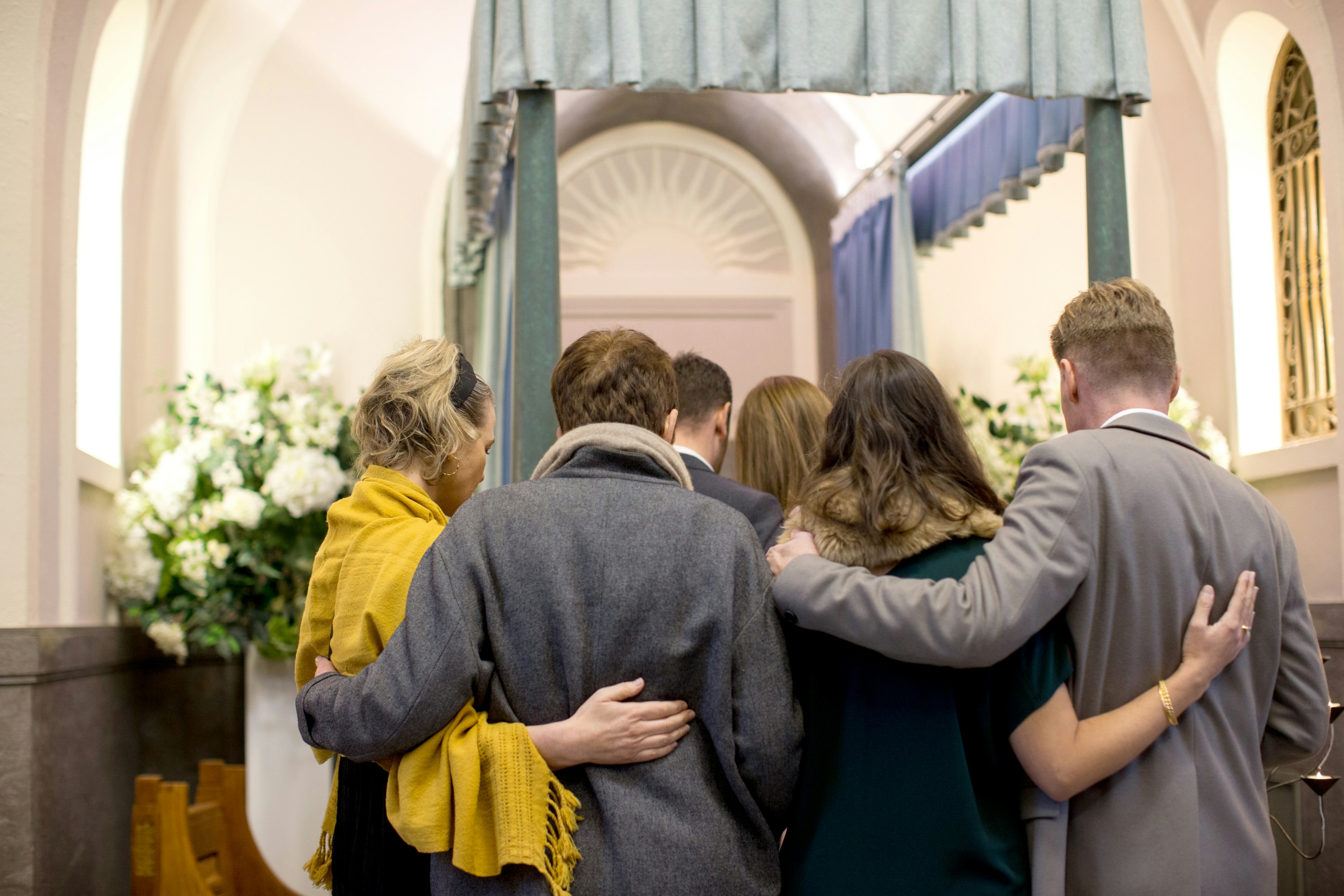
The stages of grief and tips on how to cope with them
Unfall, Krankheit, Altersschwäche. Es gibt viele Gründe, warum Menschen mitten aus dem Leben gerissen werden. Eines haben all diese Schicksalsschläge gemeinsam: Die Hinterbliebenen leiden. Und zwar oft so sehr, dass sie die Gefühle, die auf sie herabstürzen, nicht einmal in Worte fassen können. Doch der Zug des Lebens hält nicht an und wartet nicht, bis sie mit ihrer Trauerarbeit fertig sind, sondern er fährt unaufhörlich weiter. Genau das macht den Trauerprozess so schwierig. Aber wie lässt sich Trauer am besten bewältigen und gibt es spezielle Phasen? In diesem Blogbeitrag beleuchten wir das Thema Trauerbewältigung und geben Tipps.
Über die einzelnen Phasen der Trauer
Kein Mensch gleicht dem anderen, unsere Leben sind grundverschieden. Die Folge: Auch jeder Trauerprozess ist individuell. Nichtsdestotrotz haben Experten gewisse Parallelen erkannt und Modelle entwickelt. Jedes dieser Konzepte charakterisiert verschiedene emotionale Stationen, die viele Menschen durchlaufen, um von einem akuten seelischen Schmerz letztendlich an einen Punkt zu gelangen, an dem es möglich wird, so mit Trauer umzugehen, dass kein chronisches Problem entsteht.
Zu den häufigsten chronischen Problemen zählen etwa Depressionen, Schlafstörungen, bipolare Störungen, Psychosen oder Essstörungen. Eine, die sich intensiv mit den unterschiedlichen Phasen der Trauer auseinandergesetzt hat, ist die Forscherin Elisabeth Kübler-Ross.
Ihr Modell besteht aus fünf Phasen:
Phase 1: Leugnen
Der Tod eines geliebten Menschen trifft uns immer unvorbereitet – selbst dann, wenn wir schon eine Zeit lang damit rechnen mussten. In der ersten Phase stehen die meisten daher unter Schock, können es nicht glauben, fühlen sich hilflos. Genau deswegen leugnen viele im ersten Moment die Tatsachen. Oft ist dies eine Schutzfunktion, um dem eigenen Organismus Zeit zu geben, bis er sich mit dem Verlust auseinandersetzen kann. Im Normalfall dauert diese Phase wenige Tage bis einige Wochen.
Phase 2: Wut
Die zweite Phase wird von vielen Fragen begleitet: Warum ich? Warum mein Kind? Warum konnte es der Arzt nicht verhindern? Oder auch: Warum tut Gott mir das an? Wutgefühle sind grundsätzlich nichts Schlimmes, denn sie helfen Hinterbliebenen, sich vom Schmerz zu erholen, indem nun anderes in den Fokus rückt. Es ist daher wichtig, diese Emotionen zuzulassen.
Phase 3: Verhandlung
Die Zeit noch einmal zurückdrehen zu können – das wünschen sich viele. So manch einer glaubt, einen Pakt mit dem Schicksal schließen zu können, nach dem Motto: „Ich tue etwas Gutes und bekomme dafür etwas Gutes zurück.“ Manche verlieren sich jedoch in dieser Aufopferung und driften in zwanghafte Verhaltensweisen ab. Dieses innerliche Verhandeln mit sich selbst und dem Leben führt nicht selten zu körperlicher Erschöpfung und die Emotionen fahren Achterbahn.
Phase 4: Verzweiflung
In der vierten Phase setzt langsam das Begreifen des Verlustes ein. Die Folge ist eine körperliche und seelische Niedergeschlagenheit, die oft gravierende Auswirkungen auf das alltägliche Leben des jeweiligen Menschen hat. Essstörungen, Schlafprobleme, Depressionen, soziale Isolation oder die Flucht in Abhängigkeiten charakterisieren diesen Abschnitt.
Phase 5: Akzeptanz
Irgendwann macht sich ein Gefühl der Akzeptanz breit. Der Trauernde kann die Situation so annehmen, wie sie ist und schließt mit dem Verlust und dem Leben Frieden. In dieser Phase finden Hinterbliebene oft erst den Mut, Objekte des Verstorbenen wegzuräumen oder einen Umzug zu wagen.
Trauer ist ein individueller Prozess
Doch Achtung: Auch wenn sich bei vielen ähnliche Muster abzeichnen, so ist und bleibt Trauer ein individueller Prozess. Und dieser ist nicht zuletzt von individuellen Bindungsmechanismen und -fähigkeiten geprägt, genauso wie von der Kultur, in der wir aufwachsen oder mit der wir in Berührung kommen. Um Trauer zu bewältigen, gibt es daher keine allgemeingültigen Heilmittel – vielmehr sollte sich jeder Mensch nicht nur die Zeit zum Trauern nehmen, sondern auch jene Form der Bewältigung finden, die für ihn persönlich passt.
Und zwar fernab von Konventionen und Erwartungen anderer. Denn viele Gesellschaften versuchen Trauernden heutzutage nach wie vor aufzuzwingen, wie sie zu trauern haben. Das kann den eigenen Trauerweg jedoch negativ beeinflussen. Auf der anderen Seite sollten sich Angehörige und Außenstehende nicht in den Trauerprozess anderer einmischen.

Wie sich die Trauer bewältigen lässt
Gewisse Handlungsweisen haben sich dennoch bewährt. Daher möchten wir Ihnen an dieser Stelle noch ein paar Tipps zur Trauerbewältigung geben:
Lassen Sie Gefühle zu: Gerade in den ersten Trauerphasen können sich Traurigkeit und Ohnmacht, aber auch Wut und Ärger breitmachen. Unterdrücken Sie diese Gefühle nicht, sondern lassen Sie sie zu und äußern Sie sie auf angemessene Art und Weise. Oft hilft ein Gespräch mit vertrauten Personen oder Sie schreiben sich die Gefühle von der Seele. Auch körperliche Aktivitäten wie ein Spaziergang, eine Laufrunde bis hin zu Krafttraining können helfen. Wichtig ist nur, dass Sie diese Emotionen nicht unterdrücken, damit sie nicht zu Depressionen oder anderen Krankheiten führen können.
Kommunizieren Sie mit Freunden und Familie: Kommunikation ist alles – auch in der Trauerarbeit. Suchen Sie Trost bei Ihren Lieben, lassen Sie sich auf gemeinsame Aktivitäten ein und greifen Sie auf das offene Ohr vertrauter Menschen zurück. Umgekehrt haben Sie aber auch das Recht, in besonders herausfordernden Zeiten offen zu kommunizieren, dass Sie gerade keine Ratschläge oder Nähe wünschen. Eine weitere Möglichkeit sind Trauerfreundschaften, schließlich ist geteiltes Leid halbes Leid. So unterstützt etwa die Plattform „Trosthelden“ (Link zu: https://www.trosthelden.de/) Menschen dabei, Trauerfreunde zu finden, die nicht nur eine wertvolle Stütze sein können, sondern daraus ergeben sich nicht selten Freundschaften fürs Leben. Dieses wunderschöne Projekt unterstützen wir von Mevisto daher gerne: Mevisto-Kunden erhalten einen Code, mit dem sie dort ein günstigeres Abo abschließen können.

Tun Sie sich etwas Gutes: Wer trauert, vergisst oft auf die wichtigste Person seines Lebens: auf sich selbst. Tun Sie sich daher auch im Trauerprozess hin und wieder etwas Gutes – gönnen Sie sich eine Reise, richten Sie die Wohnung neu ein oder führen Sie sich selbst zum Essen aus.
Flüchten Sie nicht in Süchte: Alkohol, Medikamente und Drogen stellen für viele eine verlockende Möglichkeit dar, der Trauer Herr zu werden. Doch auch wenn Betroffene das Gefühl haben, damit den Schmerz zumindest kurzzeitig lindern zu können, so sind die Langzeitfolgen verheerend. Seien Sie sich daher über das große Suchtpotenzial bewusst!
Nehmen Sie Hilfe an: Haben Sie das Gefühl, nicht mehr allein aus der Trauer herauszufinden, so zögern Sie nicht, sich professionelle Hilfe zu holen. Das ist kein Zeichen von Schwäche, sondern von Stärke!

Schaffen Sie Zeit und Rituale: Wer Trauer immer nur vor sich wegschiebt und sich nie die Zeit nimmt, an den verstorbenen Menschen zu denken, der riskiert, dass ihn die Trauer auf einmal von einem Tag auf den anderen überwältigt – zum Beispiel in ruhigeren Phasen ohne Ablenkung. Besser ist es, sich regelmäßig Zeitfenster zum Trauern zu schaffen. Auch Rituale können dabei helfen. Manche Menschen zünden abends eine Kerze für Verstorbene an, andere machen einen Spaziergang zu jenen Orten, die sie besonders an diese Person erinnern und wieder andere denken beim Lieblingslied des Verstorbenen an ihn und das, was ihn ausmachte.
Eine weitere Möglichkeit ist es, Schmuckstücke aus der Asche oder den Haaren geliebter Menschen anfertigen zu lassen. Wir von Mevisto sind Experten auf diesem Gebiet und haben ein spezielles Verfahren hierfür entwickelt. Jeder unserer Edelsteine ist einzigartig, hat einen eigenen Charakter und erzählt eine eigene Geschichte – nämlich jene Ihres Herzensmenschen. Damit wird es möglich, geliebte Menschen auch nach dem Tod noch ganz nah bei sich zu tragen.

